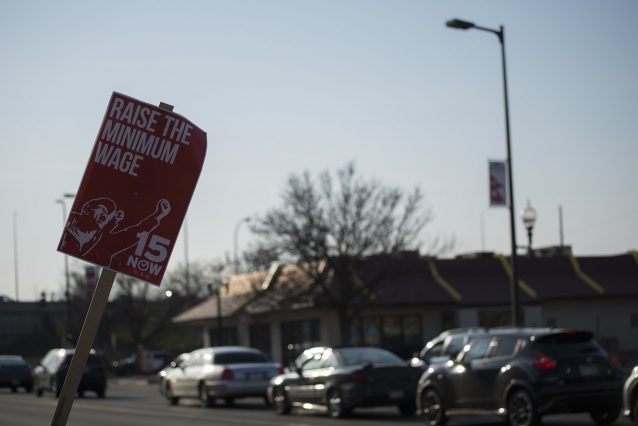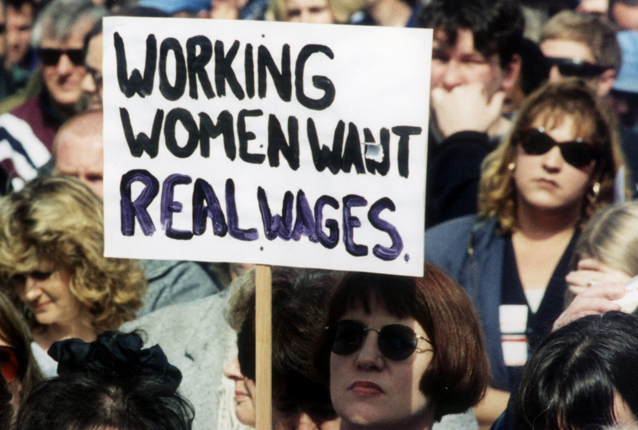Although the restaurant industry is one of the fastest growing sectors of the U.S. economy, individuals who earn “tipped wages” remain particularly disenfranchised.
The National Restaurant Association touts the false notion that “tip-earning employees can be among a restaurant’s highest earners.” In fact, industry wages are extremely low. People working in restaurants are America’s lowest-paid, and are highly likely to live in poverty. Restaurants are notorious for not providing the basics that working people need to lead a good life, be it affordable health insurance, paid sick days, advanced notice of schedules, or retirement plans.
Rebecca Williams, a server in Atlanta, has waited tables for about 30 years, consistently earning $2.13 an hour before tips. But those tips fluctuate from week to week. As a result of her meager pay, she hasn’t had health care for years. She also said “I can’t even think about retirement. I’d go into shock.”
It’s also shocking to learn that the history of tipping has racist roots. Saru Jayaraman, co-founder of the Restaurant Opportunities Centers United (ROC United), explains European aristocrats first popularized the practice by slipping gratuities to their hosts’ servants. By the mid-1800s, rich Americans normalized tipping. Restaurants and rail operators embraced tipping “because it enabled them to save money by hiring newly freed slaves to work for tips alone.” To this day, the exploitation continues.
Federal law only requires employers to pay a paltry $2.13 per hour to individuals who regularly earn more than $30 per month in tips. The companies are responsible for making up the difference. Unfortunately, restaurants often underpay the people who work for them, cheating them out of minimum wage, overtime, and holiday pay.
Although many servers find it challenging to make ends meet on tipped income, studies show that white male servers receive higher tips than Blacks in the same role. Of all people who work in restaurants, White men typically earn the most and hold the highest paying positions (like managers and bartenders). In comparison, people of color tend to land lower paid opportunities, like cashiers, counter attendants, dishwashers and dining room attendants. Currently, non-whites working in restaurants earn 56 percent less than their white counterparts.
A Pew Hispanic study found that at least 20 percent of all cooks and 28 percent of all dishwashers are undocumented Americans. Those who are undocumented may experience workplace discrimination, unsafe working conditions, and wage theft. If such exploitation occurs, immigrants have little recourse to regain lost wages without fear of exposing their status and risking deportation. Abraham Lorenzo, a server at a Center City Philadelphia restaurant who came from Mexico City 15 years ago, knows this firsthand. “From 2005 to 2016 they did not even pay me a minimum wage. I lived off of tips. And they took money from my tips for broken dishes or glasses, and credit-card fees. I knew what they were doing was wrong [but] I wanted to keep my job. A lot of the people I work with have families, and they were terrified of retaliation, whether it was losing their jobs or being deported,” he said.
Inequality among people working in restaurants results from various structural and racial barriers. This group already earns the lowest wages out of all jobs in the United States, with limited opportunities for economic advancement. But people of color, primarily Blacks and Latinos, experience issues with transportation, high costs of childcare, lack of social networks, and prior interactions with the criminal justice system, which exclude or prevent them from advancing in their careers. Also, restaurant owners’ explicit and implicit bias plays a role. Those interviewed for a study on racial and gender segregation in the industry exhibited employer discrimination and “more segregation between service and kitchen positions.” Because a higher percentage of Whites work the Front-of-the-House, while people of color worked the Back-of-the-House, (or are completely absent from restaurants that are not ‘ethnic’), opportunities for higher pay and career development for the latter group are slim-to-none.
It’s not just racial minorities who struggle in the restaurant world. Women comprise 71 percent of tipped servers and are two times more likely to rely on food stamps. And the numbers are even worse for women of color who earn 71 percent of what white men earn. Many of these women also are mothers, and barely scrape by on unsustainable income. According to a ROC United report, women of color face significant barriers in obtaining livable-wage positions in this industry. Though they make up the highest percentage of those working in the Front-of-the-House (36 percent) and the Back-of-the-House (23 percent), they earn the lowest wages in both categories: $10.21 and $9.92 per hour. With women more likely to hold a large percentage of minimum wage jobs, an increased wage would help close the gender pay gap and contribute to a greater quality of life for women who work. In addition to earning poverty wages, women working in restaurants face five times more sexual harassment than those in other professions. In fact, an astronomical 37 percent of EEOC sexual harassment charges came from women working in the restaurant industry.
Raising the minimum wage is key to ending shameful labor practices in the restaurant and other service industries. Donell Martin, a member of Centro de Trabajadores Unidos en Lucha (CTUL)/Center for Workers United in Justice, testified at a recent public hearing in Minneapolis, where citizens proposed a $15 minimum wage raise. He said, “I work at Pizza Luce in the back of the house, and we need to raise the minimum wage to $15 and still be able to get tips as well. We cannot survive on anything less than that.” Alex Doebler, a bartender at Buca di Beppo in Minneapolis also said: “A $15-an-hour base wage plus tips is a living wage, and anything less than that leaves tipped workers behind.”
Across the country, working people in the restaurant industry, along with organizations like ROC United, CTUL, and other advocates, are fighting hard to make crucial changes to the tipped wage system so more men and women can earn a fair return on their work. An increased minimum wage would solve the critical inequality issues women and people of color face, and help close the pay gap and wealth gap. It also would significantly increase economic and social opportunities for this group of working people, as well as for their families and their futures.





That’s the biggest load of bull i’ve read in a while. These so called statistics being used are from controlled groups to get the outcome they want. Exploitation? Let’s look at who is exploiting 911 here for personal and business gain.
Saru is so full of it! I guess this is why she was laughed out of the hearing that got our Maine tip credit reinstated!!! It boggles my mind how she gets paid big bucks, by unaffected people, to go spout her garbage nationally. Saru just made this article mostly about race. Not to sound heartless but if the undocumented illegals are feeling so desperate for change, they should have come here legally. I cannot sympathize for their fear of deportation. Exploiting these people is directing the attention of the sympathizers that will jump on the bandwagon to help the tipped workers. That don’t need help!
This is utter propaganda and filled with lies.
What an absolute piece of garbage.